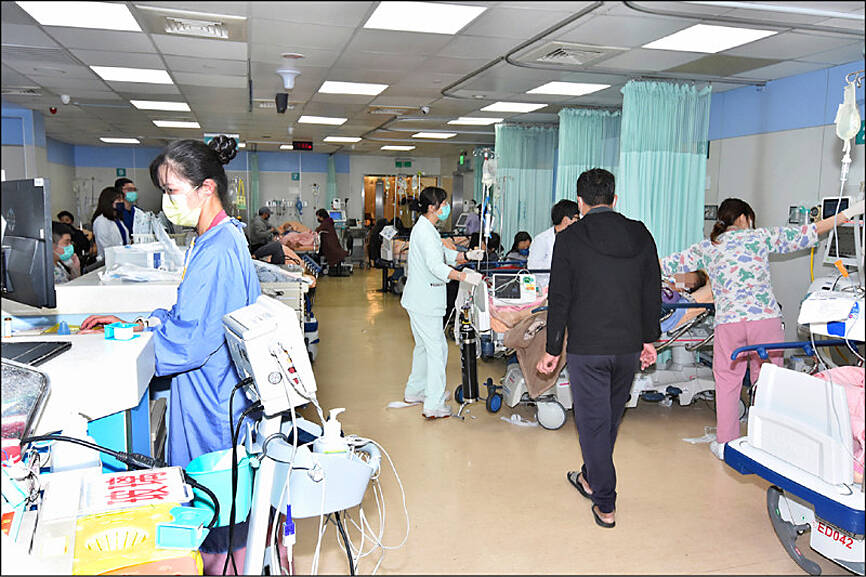The government next year is to launch a Cabinet-level task force to fight global pandemics, the spread of superbugs and other emerging threats to public health, the Ministry of Health and Welfare said yesterday.
Minister Without Portfolio Chen Shih-chung (陳時中), who headed the ministry during the COVID-19 pandemic, has been tapped to run the task force, a ministry spokesperson said at the Cabinet meeting in Taipei.
The ministry is to outline the task force’s organization, authority and functions in the “national integrated epidemic prevention plan” scheduled for release in November for the Executive Yuan’s approval, they said.

Photo: Taipei Times
The task force is intended to improve horizontal communication and multi-agency cooperation in public health matters to address novel health threats stemming from global warming, ecosystem disruption and globalization, they said.
The organization’s mandate is to mitigate the dangers posed by new or re-emerging zoonotic diseases, the regional or global spread of infectious diseases, diseases that have been neglected by researchers, regulatory gaps in food safety standards and superbug outbreaks, they said.
The task force would comprise of government officials across the MOHW, Ministry of Agriculture, Ministry of the Interior and academics from related disciplines, they said.
Premier Cho Jung-tai (卓榮泰) approved the proposal at the Cabinet meeting after emphasizing the importance of coordination between central and local governments.
In related news, the health ministry has since yesterday increased medical appointment slots for gastroenterological and flu-like diseases, after a surge in cases caused overflows at the nation’s 21 government-owned general hospitals.
The extra appointment slots would be made available day and night, said Wang Yu-wei (王裕煒), deputy chief executive officer at the Hospital and Social Welfare Administration Commission.
The ministry aims to add 924 slots per month, but hospitals may decide to assign more doctors or order doctors to work more cases according to staffing levels and local conditions, he said.
People with gastroenterological or flu-like symptoms are to be directed to a relevant medical department or local clinics when appropriate to avoid overcrowding emergency rooms, Wang said.
The measure would remain in effect until the number of cases fall back to normal levels, Wang said.
People displaying moderate symptoms of the flu or stomach flu are encouraged to report to the appropriate hospital department or a local clinic to allow emergency rooms to focus on life-threatening conditions, he said.
Deputy Minister of Health and Welfare Chou Jih-haw (周志浩) said that government data suggest the crisis of overcrowded emergency rooms appears to be winding down.
Hospitals are reporting fewer people on waiting lists for beds and in emergency room queues, although the number is still significantly higher than normal, he said.
The health ministry is dealing with the situation by focusing on improving the flexibility of bed distribution, horizontal communication between hospitals and educating the public about the hierarchy of medical needs, Chou said.
People are urged to wash their hands and wear masks in public to avoid getting sick, and seek medical attention at neighborhood clinics if their condition is not severe, he said.
Additional reporting by CNA

Taiwan is stepping up plans to create self-sufficient supply chains for combat drones and increase foreign orders from the US to counter China’s numerical superiority, a defense official said on Saturday. Commenting on condition of anonymity, the official said the nation’s armed forces are in agreement with US Admiral Samuel Paparo’s assessment that Taiwan’s military must be prepared to turn the nation’s waters into a “hellscape” for the Chinese People’s Liberation Army (PLA). Paparo, the commander of the US Indo-Pacific Command, reiterated the concept during a Congressional hearing in Washington on Wednesday. He first coined the term in a security conference last

Prosecutors today declined to say who was questioned regarding alleged forgery on petitions to recall Democratic Progressive Party (DPP) legislators, after Chinese-language media earlier reported that members of the Chinese Nationalist Party (KMT) Youth League were brought in for questioning. The Ministry of Justice Investigation Bureau confirmed that two people had been questioned, but did not disclose any further information about the ongoing investigation. KMT Youth League members Lee Hsiao-liang (李孝亮) and Liu Szu-yin (劉思吟) — who are leading the effort to recall DPP caucus chief executive Rosalia Wu (吳思瑤) and Legislator Wu Pei-yi (吳沛憶) — both posted on Facebook saying: “I

The Ministry of Economic Affairs has fined Taobao NT$1.2 million (US$36,912) for advertisements that exceed its approved business scope, requiring the Chinese e-commerce platform to make corrections in the first half of this year or its license may be revoked. Lawmakers have called for stricter enforcement of Chinese e-commerce platforms and measures to prevent China from laundering its goods through Taiwan in response to US President Donald Trump’s heavy tariffs on China. The Legislative Yuan’s Finance Committee met today to discuss policies to prevent China from dumping goods in Taiwan, inviting government agencies to report. Democratic Progressive Party Legislator Kuo Kuo-wen (郭國文) said

The Ministry of Economic Affairs has fined Taobao NT$1.2 million (US$36,900) for advertisements that exceeded its approved business scope and ordered the Chinese e-commerce platform to make corrections in the first half of this year or its license would be revoked. Lawmakers have called for stricter supervision of Chinese e-commerce platforms and more stringent measures to prevent China from laundering its goods through Taiwan as US President Donald Trump’s administration cracks down on origin laundering. The legislature’s Finance Committee yesterday met to discuss policies to prevent China from dumping goods in Taiwan, inviting government agencies to report on the matter. Democratic Progressive Party